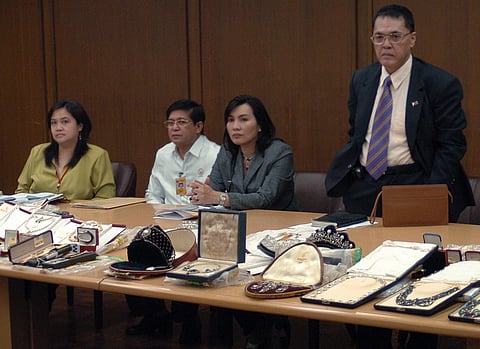
- NEWS
- the EDIT
- COMMENTARY
- BUSINESS
- LIFE
- SHOW
- ACTION
- GLOBAL GOALS
- SNAPS
- DYARYO TIRADA
- MORE

The Sandiganbayan has dismissed the civil case against the heirs of the late strongman Ferdinand Marcos Sr.'s crony in exchange for the multi-million assets related to the alleged ill-gotten wealth be returned to the government.
The heirs of the late Roman Cruz Jr., Marcos Sr.'s former president and general manager of the Government Service Insurance System, entered into a compromise agreement with the Presidential Commission on Good Government (PCGG) praying to drop the 37-year-old case against the former and other parties, including Emilia Cruz, the surviving spouse.
Under the pact, Cruz's heirs will relinquish real and personal properties purportedly connected with the ill-gotten wealth such as two condominium units and two parcels of land in Baguio, two residential lots in Antipolo, apartment in Makati, and shares of stock in PLDT, and P1.10 million in cash in an escrow account at the Bureau of the Treasury kept in trust for Europa Condominium.
In return, the government will dismissed all pending civil cases against them. The petitioners manifested that the late Marcos Sr. and former first lady Imelda Marcos are not parties to the remaining properties involved in the case.
Lodged by the PCGG on 21 July 1987, the civil case seeks to recover from the Marcoses and Cruz at least P276.69 million in assets that was amassed during Marcos Sr.'s two-decade rule.
In October, the Sandiganbayan dismissed a wealth forfeiture case against the three due to "inordinate delay."
Cruz died in January 2001 and has since been substituted by his heirs. Meanwhile, the late Marcos Sr. was represented by his son and namesake, President Ferdinand Marcos Jr.
In junking the decades-old lawsuit, the anti-graft court pointed out that the 95-year-old Imelda was the only extant living defendant and that "her ability to testify and recall the events has assuredly declined, as has her health.”
In the compromise agreement, Cruz's heirs and the PCGG told the Sandiganbayan that the same had already been reviewed and approved by the Office of the Solicitor General and the Department of Justice.
A compromise agreement is a contract. Under the principle of autonomy in contract law, parties may enter into contracts as long as they are not contrary to law, morals, good customs, or public policy.
In response, the Sandiganbayan ruled, “After a close scrutiny of the provisions mentioned above, the court finds them not contrary to law, morals, or public policy.”
“The court then deems it proper to approve the compromise agreement and to grant the joint omnibus motion,” the court added.
